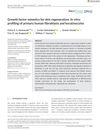 3 citations,
June 2022 in “Dermatology and therapy”
3 citations,
June 2022 in “Dermatology and therapy” A new botanical treatment improved hair growth and symptoms in lichen planopilaris patients.
 3 citations,
May 2021 in “Archiv der Pharmazie”
3 citations,
May 2021 in “Archiv der Pharmazie” SUN11602 and ONO-1301 could help in skin healing and creating artificial skin.
 October 2023 in “Scientific reports”
October 2023 in “Scientific reports” Dexamethasone affects hair growth by altering levels of proteins that either promote or inhibit hair follicle growth.
[object Object]  80 citations,
April 2018 in “Trends in Molecular Medicine”
80 citations,
April 2018 in “Trends in Molecular Medicine” Lichen Planopilaris and Frontal Fibrosing Alopecia may help us understand hair follicle stem cell disorders and suggest new treatments.
 68 citations,
May 2016 in “Experimental dermatology”
68 citations,
May 2016 in “Experimental dermatology” FFA's causes may include environmental triggers and genetic factors.
 53 citations,
September 2020 in “Stem Cell Research & Therapy”
53 citations,
September 2020 in “Stem Cell Research & Therapy” New methods to improve the healing abilities of mesenchymal stem cells for disease treatment are promising but need more research.
 47 citations,
February 2021 in “Pharmacological research”
47 citations,
February 2021 in “Pharmacological research” Exosomes can improve skin health and offer new treatments for skin repair and rejuvenation.
 40 citations,
December 2015 in “Stem Cells International”
40 citations,
December 2015 in “Stem Cells International” Mesenchymal stem cells help improve wound healing by reducing inflammation and promoting skin cell growth and movement.
 30 citations,
January 2000 in “Dermatologic Clinics”
30 citations,
January 2000 in “Dermatologic Clinics” Finasteride and minoxidil are effective FDA-approved treatments for androgenetic alopecia.
 22 citations,
March 2018 in “American Journal of Clinical Dermatology”
22 citations,
March 2018 in “American Journal of Clinical Dermatology” New acne treatments show promise as alternatives to traditional therapies.
 22 citations,
March 2000 in “Clinics in Dermatology”
22 citations,
March 2000 in “Clinics in Dermatology” Many treatments for hair loss lack proper testing and FDA approval, so their effectiveness is uncertain.
 22 citations,
April 1998 in “Dermatologic Clinics”
22 citations,
April 1998 in “Dermatologic Clinics” Interferons are effective for some skin conditions and cancers, but can have side effects and need more research for optimal use.
 18 citations,
September 2020 in “International Journal of Nanomedicine”
18 citations,
September 2020 in “International Journal of Nanomedicine” Both human and animal-derived small extracellular vesicles speed up skin healing equally well.
 13 citations,
January 2022 in “Stem cell reviews and reports”
13 citations,
January 2022 in “Stem cell reviews and reports” Mouse stem cells from hair follicles can improve wound healing and reduce scarring.
 13 citations,
March 2013 in “International Journal of Cosmetic Science”
13 citations,
March 2013 in “International Journal of Cosmetic Science” AcSDKP may help prevent skin and hair aging and promote their growth.
 10 citations,
May 2020 in “Dermatology Research and Practice”
10 citations,
May 2020 in “Dermatology Research and Practice” Proteoglycans are important for hair growth, and a specific treatment can help reduce hair loss.
 5 citations,
January 2019 in “Elsevier eBooks”
5 citations,
January 2019 in “Elsevier eBooks” Current therapies cannot fully regenerate adult skin without scars; more research is needed for scar-free healing.
 1 citations,
January 2024 in “Theranostics”
1 citations,
January 2024 in “Theranostics” Exosomes show promise for future tissue regeneration.
 January 2024 in “Frontiers in immunology”
January 2024 in “Frontiers in immunology” Histone modification is key in treating chronic inflammatory skin diseases.
 October 2022 in “Journal of experimental and clinical medicine”
October 2022 in “Journal of experimental and clinical medicine” Repurposing existing drugs for COVID-19 shows promise but requires more research to confirm effectiveness.
[object Object] 
Vitamin D is crucial for skin health and managing skin diseases.
 January 2021 in “Türkiye klinikleri dermatoloji dergisi”
January 2021 in “Türkiye klinikleri dermatoloji dergisi” Eyebrow loss in frontal fibrosing alopecia is common and may be linked to other health issues.
 January 2009 in “Springer eBooks”
January 2009 in “Springer eBooks” The document concludes that treating skin conditions should include psychological care and a multidisciplinary approach is essential for effective management.
December 2022 in “Clinical and experimental dermatology and therapies” Adding the topical gel improved hair growth more than using minoxidil or finasteride alone.
105 citations,
April 2014 in “Trends in Pharmacological Sciences” Targeting the Smoothened receptor shows promise for treating certain cancers.
 2 citations,
June 2023 in “Pharmaceutics”
2 citations,
June 2023 in “Pharmaceutics” Nanofiber scaffolds help wounds heal by delivering drugs directly to the injury site.
 13 citations,
April 2022 in “Anais brasileiros de dermatologia/Anais Brasileiros de Dermatologia”
13 citations,
April 2022 in “Anais brasileiros de dermatologia/Anais Brasileiros de Dermatologia” The document concludes that more research is needed to find effective treatments for Lichen planopilaris and Frontal fibrosing alopecia.
10 citations,
January 2015 in “European journal of pharmacology” Ginsenoside Rb1 may help remodel hypertrophic scars effectively at a dose of 0.56 mg.
3 citations,
June 2021 in “Frontiers in genetics” The protein STAT3 slows down cell growth by blocking the FST gene, which affects hair development in sheep.
 January 2025 in “Cell Communication and Signaling”
January 2025 in “Cell Communication and Signaling” CXXC5 can both suppress and promote cancer, making it a complex target for treatment.


























